Editor’s Note: This is the fourth story in a multipart series. Read part one, part two, and part three.
During his three-decade Marine Corps career, Sgt. Maj. Jayme Winders adorned his offices with dozens of items that told the story of his service. There were photographs from his deployments around the world and certificates that marked his promotions and graduations at the top of his class from military schools.
From the time he was a child, Winders wanted to be a Marine, but in 2012, during a tour in South Korea, Winders’ whole life—and his love for the Marine Corps—changed when he reported a two-star general for abuses of power.
“I was a true believer,” Winders told The War Horse during a phone interview. “Twenty-eight years, true-blue warrior, 100% Semper Fi do or die, death before dishonor—all that good stuff.”
But he witnessed junior enlisted Marines being forced to do household chores, wait on the general’s wife, and polish shoes, he said. The young Marines were also forced to hang Christmas lights. But they didn’t decorate just one general’s home.
The junior Marines decorated at least one other general officer’s home, Winders said.

“When you’re a general, people want to do things, and you have to basically order them not to do those,” Maj. Gen. Michael Regner said in a report acquired by Marine Corps Times in 2015. “Otherwise, you find yourself in the situation I’m in today.”
The sergeant major also reported that the general accepted unauthorized gifts that were later donated to on-base nonprofits after he got caught: a gold-plated crown, a five-foot bottle of ginseng, and much more, Winders said. He saw a colonel order a sergeant to protect the general’s wife by altering records to cover up an unauthorized event, he said.
But the broader problems he reported to the Corps were whitewashed, he said.
After Winders reported the abuse to the inspector general, the Corps’ two most senior Marines at the time, Gen. James Amos and Sgt. Major Micheal Barrett, then traveled to South Korea. The two senior Marines met with Winders and the general Winders accused of abusing his rank.
Winders walked into the conversation believing the accused general was being fired from his job.
“How do you feel about Bahrain?” Winders said Barrett, the sergeant major of the Marine Corps, asked him, offering what many consider a strategic offramp to retirement: civilian clothing, warm weather, travel opportunities, and shopping.
“I remember looking down for just a second,” Winders said. “And I remember looking back up to him, and I say, ‘You know, sergeant major, I know I’m supposed to say yes, but no.’”
Following an investigation, Winders said the inspector general of the Marine Corps substantiated the complaint that the general inappropriately forced a Marine to assemble a grill at his home—but that was all.
“The inspector generals do not exist to find senior officer misconduct,” Winders said. “They look for other reasons to excuse poor behavior.”
Instead, Winders found his own job was on the line. For the next few months, he fought his removal, but to no avail. During this time, he also reported a colonel for drunkenly fraternizing with lower-enlisted Marines in the barracks, he said.
“The more I spoke out, the more my wife and I were treated like dog shit,” Winders said. “It wasn’t that the other officers were in on the abuse, but they didn’t do anything to stop it.”
It was clear to Winders that his career was over.
“It was unbelievable,” Winders said. “What have I been doing with the last 28 years? Have I been a liar all this time and talking about this Marine Corps thing that doesn’t really exist?”

The general was reassigned to work directly with then-Commandant Gen. Amos, who had been found to have unlawfully intervened after Marines were accused of urinating on dead Taliban fighters and was accused of showing preferential treatment for the son of a former commandant.
Winders’ tour was cut short and he was sent to a unit in Florida, where he retired.
His forced retirement caused Winders to think back to all the non-judicial punishments with life-changing consequences he had helped oversee during his career.
“I felt dirty,” he said. “I had shit coming out of my mouth, talking about good order and discipline and what was in the best interest of the institution. … And when I dealt with this shit with the general, I realized that it’s all bullshit—it doesn’t matter.”
When it comes to top officers, “They do whatever they want and they get away with whatever they want,” he said.
Seven years after he made his complaint, Winders told The War Horse he should have fought more vigorously for his superior to be held accountable. But in the end, sacrificing his career was justified, and standing up for the Corps’ values of honor, courage, and commitment is a battle worth fighting, he said.
His military plaques and awards are now tucked away in boxes in his garage. His living room contains the only evidence Winders ever served in the Corps: His Legion of Merit, Bronze Star, and retirement flag sit on a small corner shelf.
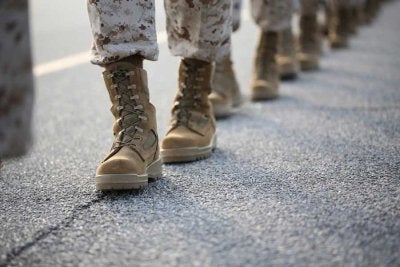
To him, they represent a military career that began and ended in two different Marine Corps.
When people find out he was a Marine and once worked in recruiting command, they ask him to speak with their children about joining the Corps. His answer is simple.
“I would not advise anybody that I cared about to join the service at this point, because I do not feel that they would be handed over to people that would care about them as if they were their own,” Winders said.
“That whole servant-leader thing that Gen. Lejeune talked about is out the window. That shit doesn’t apply anymore. It’s all about moving up and getting that next star and padding that retirement check.
“They’re just doing whatever they want, treating people however they want, administering justice how they feel like it, and finding excuses for bad behavior to try to make it go away.”
“Nobody Is Paying Attention”
Nearly a decade after the sergeant major had his career destroyed for reporting officer misconduct, retaliation against service members who report wrongdoing and abuses of power remains widespread.
Faced with accusations of cronyism, fraternization, unlawful command influences, and mistreatment of Marines with mental health issues, rather than push reform, the Marine Corps has closed ranks, silencing official response and girding up to protect a culture that is, itself, its legal system’s worst enemy.
“The Marine Corps legal community has suffered from identity ambivalence for years,” said a Marine judge advocate. “Yes, we need to be familiar with and conversant in the language of the Marine Corps. But it doesn’t follow that specialization would somehow eviscerate professional credibility.”
But a retired military defense attorney told The War Horse that Marines don’t trust their legal system. A former judge advocate wondered why anyone would want to be part of a Corps that tolerated sexist and homophobic behavior. Another former military officer referred to the Marine Corps’ investigations into legal misconduct as “garbage.” And Marine Corps officers complained that cases were manipulated to let sexual assault perpetrators off the hook with minimal punishment. The problems have already led defense counsel to be removed from cases and to one high-profile case being thrown out.
In recent weeks, the Marine Corps publicly challenged defense attorneys who questioned the honor and integrity of the system.
All of this comes with fair warning: Internal and external reports, including a 2019 survey of about 1,000 members of the legal community found Marines already worried about the lack of accountability and professionalism. This has led to delays in decisions, and in other cases, Marines received lenient sentences for maiming fellow service members and killing innocent civilians.
The crumbling foundation of the Corps’ legal system was revealed in November, when Col. Christopher Shaw told a group of young military lawyers that the Corps would not have their backs if they did their utmost to defend those they had been assigned to protect. They’d be on their own against higher command, the media, or Congress. And he told them he knew which cases they were on and that officers on their promotion boards would also know—which they saw as a direct threat against their careers.
Capt. Matthew Thomas and six fellow defense attorneys signed affidavits accusing Shaw of threatening them and of unlawfully influencing criminal proceedings. As a result, an irreversible process had begun. A conflict had been created.

Three days later, on Dec. 13, 2020, Shaw—a graduate of the U.S. Naval Academy with more than two decades in uniform as an attorney—filed a response blaming the events on a misunderstanding.
Yet Shaw had written a paper outlining all of the problems the defense attorneys say they contend with—the lack of resources and support, the Marines who flee for civilian jobs after working nights and weekends.
But a retired military defense attorney who reviewed Shaw’s statements told The War Horse that if Shaw had spent more time as a defense lawyer or chosen to write a truthful statement, he may have instead argued that he himself was a whistleblower explaining to young officers what they needed to know to thrive in the Corps’ insular legal environment.
Days later, in the government’s response to the defense motion, the Marine Corps lined up multiple officers to rebut the defense attorneys with affidavits written by leaders in charge of officer assignments, promotions, and more.
For both civilian and military legal experts, the message from their leaders was clear: The Corps publicly challenged the integrity of every Marine defense attorney who spoke out.
“Col. Shaw set the conditions in people’s minds that they cannot trust their leadership to have their back, and it appears the government has tailored their response to discredit the defense attorneys who filed those affidavits,” said retired Lt. Col. Aimee Bateman, a career Army attorney who reviewed the command investigation for The War Horse. Bateman taught criminal law at The Judge Advocate General’s Legal Center & School and spent her last three years as an Army defense attorney.
She found that the government’s statements omitted vital context and oversimplified the influence that Marines like Col. Shaw—Marines outside a defense attorney’s immediate chain of command—can have on their career assignments and retention.
“The military has very qualified legal teams, but nobody trusts them,” Bateman said. “Their credibility is compromised by the current state of the system.”
As detailed in the first three installments of this series, the problems in the military legal system have long remained hidden, but—along with the command investigation, affidavits, and statements by more than a dozen Marines—there stands Shaw’s own report to his superiors from his tour across the Marine Corps’ legal community.
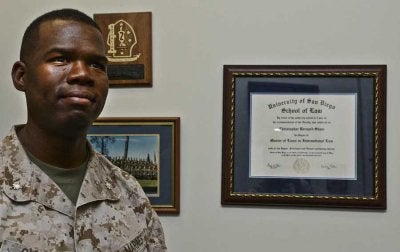
He wrote about topics that ranged from a decline in morale to a crippled technology infrastructure so flawed that attorneys do not have working computers and must use personal hard drives to share discovery materials. Private conversations between attorneys and their clients could be overheard because of insufficient office space, Shaw wrote.
But the problems extend far beyond technology or brick and mortar.
Shaw’s comments to the defense attorneys showed that good order and discipline, as well as trust in the legal system, is jeopardized while perpetuating an insular community that drives away its best talent because leaders do not address systemic issues, Bateman said.
“People are able to behave this way because nobody is paying attention,” she said.
Unprofessional, Careless, Misguided
A month after Col. Shaw made his comments, the investigating officer overseeing the investigation released their “command investigation” report to the chain of command.
In short, the Corps ruled that Shaw’s comments in November were “odd,” lacked judgment, and were “unprofessional,” but found that the evidence did not prove he spoke to the group with any malicious intent, “because there is no evidence that he knowingly, recklessly, intentionally, or otherwise wrongfully intended to cause the ‘harm’ required in order to substantiate a violation of military regulations.” The report deemed the accusations of bullying and maltreatment were unsubstantiated.
“Based on the context of the briefs it is clear to the IO [investigating officer] that Col. Shaw intended to address what he saw as a problem and did not have any evil or malicious intent when the statements were made,” according to the investigation. “Col. Shaw acknowledged that his comments were ‘unprofessional.’”
Col. Shaw laughed about a gay Marine under his charge being beaten under “don’t ask, don’t tell,” according to the report
Col. Shaw responded to a subordinate’s concerns about serving as a new parent by telling her, “At least you’re not getting shot at.”
And Col. Shaw was perceived by many active-duty and veteran lawyers from across the military as not only threatening defense attorneys in the room, but the integrity of the Marine Corps and Defense Department’s legal institutions.
“Why would you want to be involved in that tribe if that’s what we represent?” asked a retired judge advocate who served as a defense attorney and senior lawyer at the Pentagon.
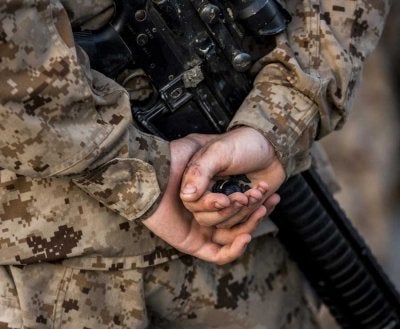
Col. Pete Houtz found “no substantiated misconduct” and ruled that the colonel did not wrongfully interfere with a criminal proceeding. The colonel did not violate any Rules for Professional Conduct or do anything that constitutes a substandard performance of his duties, the investigator said.
Marines who were familiar with Houtz’s investigation of Shaw pointed to glaring failures during the commander’s pursuit of the truth: Houtz did not write about whether Col. Shaw’s conduct was unbecoming of a Marine Corps officer under Article 133, the Marines said.
“The bottom line is that the [sic] Col Shaw’s comments were unprofessional but do not reflect critical or sustained flaws in Col. Shaw’s abilities as a Marine Officer or Judge Advocate,” wrote Houtz, who is currently assigned as a judge on the Navy-Marine Corps Court of Criminal Appeals.
But in addition to Shaw’s troubling comments in multiple settings, more than 125 pages of documents from the Corps’ own investigation released to The War Horse show Camp Lejeune is a hotbed of alleged misconduct among Marine attorneys.
In the command investigation written by Houtz, statements written by attorneys described an “inappropriate” relationship between two captains, unequal opportunities for the professional development of women attorneys, and assignments of female officers to sexual misconduct cases by male Marines because “it would be funny” to watch in court.
In a separate memo, Shaw also highlighted troubling behaviors at Camp Lejeune.
“During pregnancy during a court-martial, a judge advocate asked for rest and eating breaks,” Shaw wrote. “The judge did not allow her a break for over two hours. The judge advocate felt she was going to pass out.”
The Marine leading the troubled unit, Col. Robert Fifer, did not respond to interview requests.
There were also many “substantiated” behaviors perpetrated by a major serving as a senior trial counsel, who did not respond to interview requests.

The major allegedly gave demeaning nicknames to his subordinates and “frequently makes discriminatory and harassing comments to and about Marines,” according to the investigation.
The command investigation included a document written by the captain who filed the allegations. In it, she alleged that the major made inappropriate sexual comments and demeaned counsel and victims. Other offenses included preferential treatment, hostility, and “misbehavior” that negatively impacted productivity.
The Marine attorneys who filed the complaints against Col. Fifer and the major did not respond to interview requests. Nearly two dozen other Marine leaders who wrote statements or were named in the investigation did not respond to interview requests.
No Proficiency in Professional Responsibilities
On Feb. 9, 2022, nearly two months after the government cleared Col. Shaw of abusing his authority and threatening defense attorneys, the judge overseeing the prosecution of Eric Gilmet—one of the MARSOC 3 facing homicide charges after a bar fight in Iraq between three special forces Marines and a retired Green Beret ended in a death—dismissed the Gilmet case with prejudice.
And he dismissed it because he said Shaw abused his authority and threatened defense attorneys.
“The facts in this case can be boiled down to a simple advert,” Navy Cmdr. Hayes Larsen wrote in his written conclusion. “A senior judge advocate who occupied a position of authority over the futures of young judge advocates made threatening comments to a young judge advocate about his career … creating an intolerable tension and conflict between an accused and his specifically requested military counsel.”
Col. Shaw’s actions constitute actual and apparent unlawful command influence, the judge ruled.
The judge highlighted that Col. Shaw also submitted inconsistent statements to investigators.
“Col. Shaw’s statements provided to this Court by the government were internally inconsistent, self-serving and directly contradicted by multiple officers,” the judge wrote.
A little more than two years earlier, during a 2019 working group that surveyed dozens of generals and more than 1,000 members of the Marine Corps legal community, “respondents [were] concerned with the uniformed legal community’s overall knowledge of PR [professional responsibility] rules and requirements, lack of follow-on PR training, and a lack of mentorship and accountability.”
The report projects the problem will worsen and found an “unhealthy” 21% vacancy among captains—and a “frequent inventory shortage” among job positions for its most senior attorneys. According to one of the Corps’ supervisory public defenders, who spoke to The War Horse on the condition of anonymity for fear of retaliation, the Corps is experiencing a talent exodus, and the need for modernization is more vital than ever.
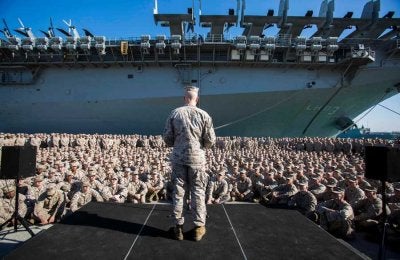
“We’ve increased the number of sexual assault prosecutions over the last 10 years, which often involve complex litigation and, when resulting in a conviction, almost always result in appellate review,” the defender said.
More complicated cases mean an increased demand for military attorneys and the resources needed to invest in their professional development.
But it’s not just junior attorneys who have asked for an increase in resources. The increase in complex cases has also created a larger backlog at appeals courts. In the last 10 years, the length of time from when an appeal petition is filed until the delivery of an oral argument has increased by more than 65%, to nearly nine months, according to a 2021 report published by the Court of Appeals for the Armed Forces. The length of time from those oral arguments to a final decision has also increased by more than 60%, to almost four months.
Time delays are not a new problem. In one of the Corps’ most egregious cases, involving a Marine accused of rape in the late 1990s, Congress scrutinized the Corps for a nine-year post-trial processing delay, as well as the Marine’s subsequent exoneration.
According to the U.S. Navy-Marine Corps Court of Appeals, “The record below reflects that the the appellant was convicted of rape solely upon the testimony of his estranged wife, nearly five years after the alleged incident occurred, and corroborated only by the victim’s own statements to her friend nearly two years after the alleged incident.”
“The military judge abdicated his role as impartial gatekeeper, and erroneously admitted testimony which compromised the credibility of this trial in its entirety,” stated the court.
The trial judge permitted the jury to hear the testimony of an incompetent witness: the alleged victim’s six-year-old son who had not been born at the time of the alleged rape, the court found. “We find the delay in this case is so egregious that tolerating it would adversely affect the public’s perception of the fairness and integrity of the military justice system.”
As for the convicted sex offender, the judge ordered his release to rectify the wrongdoing. And like countless other veterans who have their cases overturned after losing years of their lives to officer misconduct or wrongdoing, the accused cannot sue the government for damages.
“There are so many ways the system is run by amateurs,” said Rob Bracknell, a retired judge advocate and current legal adviser to an international organization. “They lost a rape conviction because they moved paperwork too slowly, and because they moved too slowly, the court limited the entire punishment to a punitive discharge.
“And nobody got fired,” Bracknell said. “They got promoted!”
Doc “Deserved a Little More Semper Fi”
A lack of integrity and transparency is not limited to the most senior generals and judge advocates in the Corps, and their hypocrisy is not limited to Marine-on-Marine cases.
In 2008, Michael Carpeso was a Navy Corpsman assigned to a Marine unit. He was shot in the face and nearly killed by Wilfredo Santiago while they served together in Iraq. The gunshot caused Carpeso to lose his eye.
The assailant left active duty before being charged, relinquishing the Corps of jurisdiction over the case.
“It is not a tale that inspires confidence in our criminal justice system,” wrote the federal judge in a 2013 opinion criticizing the commanders and lawyers involved.
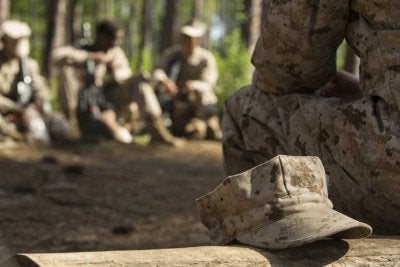
“I come away from this exercise with the firm conviction that HM3 Carpeso did not really matter much to the people who should have been fighting for justice for him.”
Five years before the judge’s written decision, Santiago’s leaders were “fully aware” that he shot Carpeso and lied to investigators. But because the war ended and Santiago was transferred to another unit, he completed his enlistment without ever being charged.
His case was transferred to the U.S. District Court for the Southern District of New York, one of the country’s most prestigious courts.
The federal judge who reviewed the case found that, from the beginning, a general, at least two colonels, and multiple field grade officers intentionally delayed the case. The Corps used tactics “to get rid of the case” instead of prosecuting it, the judge wrote.
But the problems in the case were much more fundamental. Marine attorneys didn’t fill out the most basic of forms.
“Any law student intern or paraprofessional could have finished the job in a matter of hours,” she wrote. “It is obvious they did not do what had to be done in order to court-martial Santiago because they did not want to.”

More concerning, when the Department of Justice tried to get involved with the prosecution, the Corps instead pushed for Santiago’s administrative separation from the inactive reserves, a time commitment following active service where enlisted service members can be recalled for deployments or legal proceedings.
The Corps told officials the process was a “tool in our toolbox” and a way to “grease the skids” for faster results.
The motive for suggesting administrative separation was more likely a desire to “punt the case” than to “grease the skids,” the judge wrote, adding that the Corps explained their resources for courts-martial were limited. Finding available defense counsel and a judge was “overwhelming,” the Marine Corps said.
Meanwhile, the federal judge found that Marine leaders were more focused on other things.
“[The judge advocate] put the case on the ‘back burner,’ while attending to such front-burner tasks as attending ‘training events’ and chauffeuring around a ‘high ranking general or two’ who were visiting ‘The Big Easy,’” the federal judge wrote.

On Jan. 17, 2013, just 10 days before the statute of limitations expired, Santiago was indicted by a grand jury.
In the end, Santiago paid a $10 fine and was released.
“I have spent a lot of time with the record in this unusual case,” the judge wrote in summary.
“One of the little things I noticed when reviewing the evidence was that Marines sign their internal correspondence with some variant of their familiar motto, ‘Semper Fidelis’—Always Faithful—either written out in full, or abbreviated as ‘Semper Fi,’ or even just ‘SF.’”
After a while, the disingenuous use of the Corps’ iconic motto annoyed the judge, she wrote.
“In those emails, and in their actions, the Marines displayed precious little eternal fidelity toward Michael John Carpeso,” the judge wrote. “Of course, Carpeso was not a Marine. But he served in a war zone with Marines, and risked his life to save Marines, and lost an eye because of the actions (whether accidental or reckless) of a Marine.
“Frankly, I think Michael John Carpeso deserved a little more ‘Semper Fi’ than he got from the United States Marine Corps.”
Four Decades. Little Progress.
In 2014, the year after the federal judge wrote her opinion and three decades after Kevin McDermott blew the whistle on failures in the Corps’ legal system, then-Commandant Gen. Amos told military attorneys he wanted Marine defendants “crushed” during the courts-martial of Marines who urinated on dead Taliban fighters. The commandant’s behaviors, along with those of his civilian attorney, which he denied publicly, caused the court to substantiate unlawful command influences.
The same year, the commandant directed his senior judge advocates to conduct an internal review of the possibility of “civilianization of billets and practice areas” in the Corps, like allowing attorneys to specialize in prosecution or defense, and establishing a system of justice that more closely mirrored the state and federal courts systems. Amos declined an interview request to discuss why he felt the initiative was essential.
A report, published five years later, noted that nothing had been done to address the problems.

In other words, the Marine Corps lacks the basics it needs to function as a legitimate legal system, and everyone—at least three staff judge advocates for the commandant and Marine Corps chief defense counsels—knows about the problems.
Yet no action has been taken, the report states.
And the report shows that—40 years after McDermott, the Marine attorney-turned-whistleblower, spoke up about retaliation against defense attorneys—the defense services organization lacks vital resources.
“While the roles and responsibilities of the [staff judge advocate to commandant] have significantly increased within the last decade, [the judge advocate division’s] personnel structure has not kept pace,” the report revealed. The division is also not structured in the best way for it to perform its mission: They do not have defense investigators, personnel lack sufficient qualifications, and the organization lacks an independent budget, the report stated.
And the Corps’ most senior defense attorney may lack the experience to adequately mentor her Marines, sources said. Chief Defense Counsel Col. Valerie Danyluk was a career prosecutor and judge, but served only two years in a defense billet before being assigned as the branch’s senior defense attorney. She did not respond to multiple interview requests.
In an affidavit filed in the MARSOC 3 case, Danyluk wrote that the deputy staff judge advocate to the commandant told her in 2017 that she was ineligible to serve as the chief defense counsel because she had “too much time in defense.”
“At the time, I had served only one tour in a defense billet and only two years of my (at the time) nearly 20 year career,” Danyluk wrote in January. “Nearly all of my career had been as a prosecutor, military judge, or director of a law center at that point.”
The working group also highlighted shortfalls in the Victims Legal Counsel Organization, which since 2014 has been responsible for providing services to survivors of sex crimes and domestic violence. Both of the Corps’ largest installations—Camp Pendleton, California, and Camp Lejeune, North Carolina—don’t have the resources they need to manage their caseloads and the needs of their clients, according to the report.
Before the victims legal office was created, the working group suggested assigning at least nine additional counselors to adequately handle the anticipated spike in cases.
“Retention declined in 2021 compared to 2020,” said Maj. Jim Stenger, a spokesperson for the Corps. “However, when comparing this across the last five years only the grade of [captain] has seen increased attrition year over year.”
But the 2019 report found that the “target inventory” of judge advocates “will remain unhealthy” through at least 2025.
“Increasing accessions or slowing promotion flow alone are not sufficient solutions,” the report states, and young attorneys are leaving the Marine Corps at higher rates than any other specialty.
“As of [fiscal year 2021], we have increased accessions compared to years past, which will reflect in the next few years once the lieutenants promote to captain,” Stenger said.
But experts say the Corps is not being aggressive enough about necessary changes.
If these were mistakes on a live-fire range, sinking military vehicles, or aviation mishaps, steps would have been taken long ago, they say.
“The Marine Corps Aviation Community’s handling of accidents could provide an example of how to address missteps in military justice,” the report states.
“If the military justice community were to adopt similar procedures to address missteps, it could provide additional opportunity to educate the force—particularly commanders—and “cultivate a culture of continuous learning.”
Instead, the problem has festered.
A Struggling System. In the Corps’ Own Words.
Marines say Col. Shaw’s comments about the MARSOC 3 case not only reverberated throughout the room, but will deter future victims and witnesses from stepping forward.
“The comments Colonel Shaw made about [the accused] make me hesitant to speak out on [the accused’s] behalf,” wrote one Marine officer in their affidavit. The remarks also caused them to question the Corps’ support of the Defense Services Organization—the organization launched four decades ago when McDermott and his fellow Marines first spoke out about the Corps retaliating against defense attorneys and violating the rights of service members accused of crimes.
In his written report to Marine headquarters after he made his controversial comments to defense attorneys, Shaw wrote about issues ranging from morale to resources. After working nights and weekends to get the job done, enlisted Marines and officers are leaving active duty for other opportunities because they do not feel fulfilled by their work, Shaw wrote.
The modular buildings occupied by the legal teams at Camp Lejeune—used since the legal center was destroyed in 2018 by Hurricane Florence—have “significant challenges” that adversely affect their efficiency and damage unit cohesion, Shaw wrote.

“The LSSS buildings are inadequate to support the needs of client’s and counsel’s privacy or safety. Conversations can be overheard, there is mold in the buildings and the layout of the buildings does not does not [sic] facilitate comradery.”
When asked about building conditions, officials at Camp Lejeune explained that the legal center restoration was part of more than $1.8 billion in disaster relief during 2019 and 2020 that was awarded for reconstruction on Marine Corps bases in North Carolina. Marine officials declined to comment on Col. Shaw’s written report.
Officials at Camp Lejeune also denied requests to tour the facilities at the Legal Services Support Center.
“The building they previously occupied experienced excessive water damage to such an extent that base officials determined renovations were not the best use of taxpayer funds,” wrote Maj. Matt Finnerty. “The new building is in final design and construction is expected to start later this summer with an anticipated completion during the winter of 2024.”
Officials said the Corps has completed roughly 45% of projects to repair storm damage from five years ago and that the legal center is among 24 remaining projects that will be completed within three years—a total of seven years after the storm event.
Shaw’s report also described how “technology gaps” are imposing “significant stress.” Laptops often do not work, with some attorneys cycling through six computers before finding one that works. Worse, the hard drives used are insufficient and complicate the exchange of discovery files.
“In order to mitigate, numerous judge advocates are buying hard drives to assist,” Shaw wrote.
Workspaces also do not provide adequate room for enlisted leaders to have their own offices, which often results in officers eavesdropping.
“This limits the ability for the [enlisted Marines] to train and counsel junior enlisted outside of earshot of officers who often pile on when an [enlisted Marine] is counseling a Marine,” Shaw wrote in his report.

Substandard facilities, excessive work hours, and failed turnovers are not the only ways the Marine Corps fails enlisted Marines who serve at Camp Lejeune’s LSSS. When they are sent to school to become court reporters, they do not return with satisfactory skills.
“Teaching grammar is [a] major function of court reporting school,” Shaw wrote. “Most of the time at court reporting school is spent on grammar not capturing voice.”
The enlisted Marines who spoke with Shaw recommended recruiting trained paralegals for six-year commitments.
More broadly, Shaw wrote that failing technology, limited access to transcripts, and a dysfunctional case management complicates the pursuit of justice.
“There is no true case management system which requires each section or counsel to create their own,” Shaw wrote. “Lack of access to transcripts limit[s] the ability to cross-examine and impeach.”
“Effecting Change Requires Totality of Effort”
No functioning system of accountability appears to exist for uniformed attorneys. Like many high-profile criminal cases in the military, the judge’s confirmation of unlawful behaviors in the “MARSOC 3” case exemplifies how easily military leadership can circumvent an attorney’s immediate chain of command to influence a criminal proceeding.
In March, Congressman Brian Mast, an enlisted Army veteran who served in Afghanistan, called for the remaining MARSOC 3 cases to be dismissed.
“Specifically, I have reviewed video evidence that illustrates a clear-cut case of self-defense,” Mast wrote to the secretaries of defense and the Navy, as well as the commandant of the Marine Corps.
“In fact, I am concerned that these charges are politically motivated,” Mast wrote, adding that he feared the accused were being “unjustly victimized” and “unnecessarily prosecuted.”
Yet even if the judge’s finding of unlawful command influence leads to additional dismissals, service members like the MARSOC 3 will be left with the often-insurmountable challenge of piecing together their careers, reputations, and lives outside the military.

As we detailed in the first three installments of this series, the military can take proactive steps to improve the military criminal justice system, restore the rights of the accused, and hold generals and military attorneys accountable to the same degree as other service members.
By putting additional safeguards in place, experts say, the most brilliant attorneys will rise through the ranks, and service members and American taxpayers will begin to trust the system at a higher level.
The Corps and its Judge Advocate Division have proven in the past they can adapt the legal community to overcome challenges and meet the needs of its Marines. And even one of the Corps’ most revered generals has championed the importance of an independent military defense.
“A Marine or Sailor suspected of violating the Uniform Code of Military Justice or facing administrative action is not abandoned—he or she maintains the presumption of innocence, fellow service members remain objective about the case and leaders retain heartfelt concern for the Accused’s welfare,” wrote then-Gen. James Mattis in 2012, who later became the 27th secretary of defense.
“When the purposes of military law are fulfilled, there is a direct and long-lasting positive impact on the combat power of our fighting forces,” Mattis wrote. “Consequently, the accomplishments of lawyers serving in the DSO [Defense Service Organization] result in second and third order impacts that contribute to victory on the battlefield and the strengthening of our national security. …
“It is also fundamental to keeping our honor clean in how we fight on the battlefield and how we keep hold of the respect that Marines feel for our beloved Corps and country.”
A decade later, active-duty Marines and veterans of the military legal community are calling on the commandant to not only hold his Marine officers accountable but to adapt the Corps’ legal community to a system that is not only independent and trustworthy but firm and fair for both officers and the enlisted service members they lead.
“Effecting change requires totality of effort,” wrote the authors of the 2019 review of the Corps’ legal system. “Educating the force on authority and responsibility, without enforcing accountability, is insufficient.
“The Marine Corps owes America’s sons and daughters a system of military justice, executed by educated and well-informed commanders, that is not only just, but also perceived as just.”
This War Horse investigation was reported by Thomas J. Brennan, edited by Kelly Kennedy, fact-checked by Ben Kalin, and copy-edited by Mitchell Hansen-Dewar. Abbie Bennett wrote the headlines. Five senior military attorneys volunteered their time to review this story for accuracy. All interviews were recorded and all sources included in the reporting verified the accuracy of The War Horse’s reporting prior to publication during a secondary interview process. Prepublication review was completed by Baker Hostetler.
Editors Note: This article first appeared on The War Horse, an award-winning nonprofit news organization educating the public on military service. Subscribe to their newsletter
